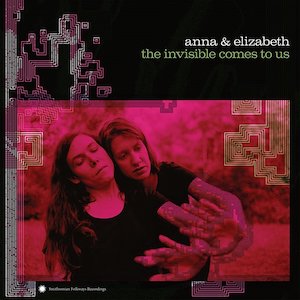 Anna and Elizabeth – The Invisible Comes To Us
Anna and Elizabeth – The Invisible Comes To Us
Smithsonian Folkways – 30 March 2018
When Anna and Elizabeth’s eponymous album came out in 2015 one of its many remarkable features was the connectedness it celebrated. There was the keenly felt connection between artist and music, but also the connection between the music and its geographical and social roots. The duo presented their takes on traditional songs in the cleanest, most unadorned of ways, but without ever forsaking the raw, earthy quality that made those songs so human in the first place. Simply put, their approach was a natural one, not academically naturalistic, but natural in the sense that the listener felt that the music and the performers were inseparable: music was part of their life, like eating or sleeping.
On The Invisible Comes To Us – their third album – the duo set out from a similar standpoint, but narrow their focus even further, in terms of place at least. The songs were collected from archives in Virginia and Vermont (Anna Roberts-Gevalt and Elizabeth LaPrelle’s home states). Most were originally recorded ‘in living rooms and kitchens’ by singers who learned them through the osmosis of oral tradition.
Opener Jeano is an atmospheric song of parting, advancing on a shimmering drone of euphonium and trombone, a serene, slow blast with a distinct undertow of modernism that immediately sets this up as something a little bit different to what the pair have done before: the geographical sources of these songs may be limited to a few US states, but their musical scope is admirably wide.
Black Eyed Susan – which like many of these songs is taken from a 1940s recording – is an intensely atmospheric experience, not least because of the juxtaposition of the traditional singing with Jim White’s quietly experimental drumming. Ripest Of Apples is a moving combination of restrained vocal harmonies and almost menacing banjo, with an impressionistic dollop of brass providing an enigmatic instrumental vignette midway through. Irish Patriot is even more vivid and experimental: voices from the archives are layered and distorted, presented against a musical backdrop that is closer to Terry Riley’s minimalism than to the Appalachian folk that the duo are known for. The effect is mesmerising: a kind of rural American hauntology.
John Of Hazelgreen is more traditional in delivery, though no less impressive. The duo’s harmonies are something special, and here they are given space to breathe alongside a quiet, birdlike clarinet. The minute-long Woman Is Walking – the only non-traditional song here – provides another showcase of the pair’s singing, while Virginia Rambler is perhaps the album’s starkest combination of old and new, like Hedy West backed by Radiohead, with a hint of musique concrete.
The experimental, cut-up techniques of musique concrete are further utilised in the startling By The Shore, a collage of spoken fragments that has more in common with sound art than with any conception of folk music. It is a bold, powerful piece in which vocal assonance meets musical dissonance. Just as experimental is Farewell To Erin, with stretched-out vocal phrases played off against a drone of pedal steel and Hardanger fiddle, at once melancholy and macabre (it’s maybe the most breathtaking use of a lap steel since Heather Leigh’s I Abused Animal). On Mother In The Graveyard they prove that they can do a straight folk song, but on closer inspection, even this is littered with unexpected twinkles and miniature musical soundscapes. Final track Margaret is a short recording, made in 1940, of Massachusetts singer Margaret Shipman, augmented by a simple, typically minimal musical backdrop. It encapsulates everything that makes this unique album both musically wonderful and historically important. Anna and Elizabeth are curators of a rich and varied musical tradition, but they are also dauntless innovators who realise that change and growth is an important part of that tradition. This willingness to experiment has helped produce a piece of work that, if there is any justice in the world, will be recognised as one of the groundbreaking American folk albums of this century.
Order via Smithsonian | Amazon | Bandcamp
https://www.annaandelizabeth.com/
